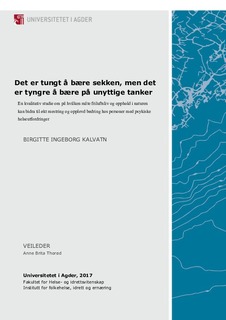| dc.contributor.author | Kalvatn, Birgitte Ingeborg | |
| dc.date.accessioned | 2017-09-22T11:51:25Z | |
| dc.date.available | 2017-09-22T11:51:25Z | |
| dc.date.issued | 2017 | |
| dc.identifier.uri | http://hdl.handle.net/11250/2456278 | |
| dc.description | Masteroppgave folkehelsevitenskap ME516 - Universitetet i Agder 2017 | nb_NO |
| dc.description.abstract | Introduction: As a result of the growth in mental illnesses and the industrial society, there is
an increased need for a place where humans can reconnect and find peace. Science shows that
almost one out of four grown up Norwegians has a mental disorder, and that physical activity,
especially by spending time in nature, can contribute to the recovery. To accommodate these
challenges, I believe that science can offer a better understanding on how we can facilitate for
health promotion accompanied with nature.
Objective and key question: The purpose of this study is to get a better and holistic
understanding on how the nature can help in promoting mental health. Especially how the
nature can increase self-efficacy and experienced recovery with people that struggle with
mental health challenges. Key question: to what extent does outdoor education and time spent
in nature contribute to increased self-efficacy and experienced recovery in persons facing
mental health challenges?
Method: The method used in this thesis is a Qualitative research perspective with ethnography
and semi-structured interviews. Participants in the study are people that have mental health
challenges or have experience with mental health care in the South of Norway.
Results: Outdoor education and time spent in nature offers a unique opportunity for selfefficacy
experiences through manageable challenges. Especially when the group you participate
in are in a safe environment, and contributes to social support and the feeling of belonging. The
nature also offers a counterweight to the daily life by being an arena where everyone is treated
the same, and the natural challenges that appears are challenges that everyone need to master.
Conclusion: Outdoor education and time spent in nature can result in increased self-efficacy
and recovery in people with mental health challenges. This happens by offering an arena for
health promotion that participate in creating relations that are health promoted.
Keywords: Outdoor education, mental health, self-efficacy, salutogenesis, recovery, nature and
identity | nb_NO |
| dc.language.iso | nob | nb_NO |
| dc.publisher | Universitetet i Agder ; University of Agder | nb_NO |
| dc.rights | Attribution-NonCommercial-NoDerivatives 4.0 Internasjonal | * |
| dc.rights.uri | http://creativecommons.org/licenses/by-nc-nd/4.0/deed.no | * |
| dc.subject | ME516 | nb_NO |
| dc.subject | Outdoor education | nb_NO |
| dc.subject | mental health | nb_NO |
| dc.subject | self-efficacy | nb_NO |
| dc.subject | salutogenesis | nb_NO |
| dc.subject | recovery | nb_NO |
| dc.subject | nature and identity | nb_NO |
| dc.title | Det er tungt å bære sekken, men det er tyngre å bære på unyttige tanker : En kvalitativ studie om på hvilken måte friluftsliv og opphold i naturen kan bidra til økt mestring og opplevd bedring hos personer med psykiske helseutfordringer | nb_NO |
| dc.type | Master thesis | nb_NO |
| dc.subject.nsi | VDP::Samfunnsvitenskap: 200::Psykologi: 260 | nb_NO |
| dc.source.pagenumber | 74 s. | nb_NO |

